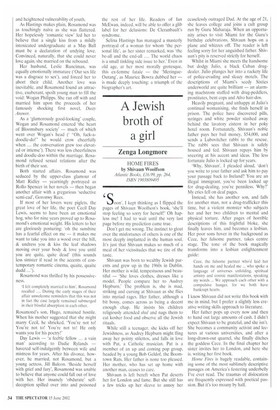A Jewish broth of a girl
Zenga Longmore
HOME FIRES by Shivaun Woolfson Atlantic Books. £16.99, pp. 264, ISBN 1903809495 Soon', I kept thinking as I flipped the pages of Shivaun Woolfson's book, 'she'll stop feeling so sorry for herself!' Oh hapless me! I had to wait until the very last page before my prediction came true.
Don't get me wrong. The instinct to gloat over the misfortunes of others is one of the most deeply implanted in the human soul. It's just that Shivaun makes so much of a meal of her vicissitudes that we tire of the taste.
Shivaun was born to wealthy Jewish parents and grew up in the 1960s in Dublin. Her mother is wild, tempestuous and beautiful — 'She loves clothes, dresses like a model. People compare her to Audrey Hepburn.' The problem is, she is mad, striking and cursing at Shivaun as she flies into myriad rages. Her father, although a bit bossy, comes across as being a decent enough chap. He insists his children religiously attended shul and nags them to eat kosher food and observe all the Jewish rituals.
While still a teenager, she kicks off her Jewishness, as Audrey Hepburn might fling away her pointy stilettos, and falls in love with Pat, a Catholic musician. Pat is a member of an up and coming pop group, headed by a young Bob Geldof, the Boomtown Rats. Her father is none too pleased. Her mother, who has set up home with another man, ceases to care.
Shivaun is left bereft when Pat deserts her for London and fame. But she still has a few tricks up her sleeve to annoy her
ceaselessly outraged Dad. At the age of 21, she leaves college and joins a cult group run by Guru Maharaja. When an opportunity arises to visit Miami for the Guru's birthday celebrations, Shivaun hops on a plane and whizzes off. The reader is left feeling sorry for her anguished father. Shivaun's pity is reserved strictly for herself.
Whilst in Miami she meets the handsome but dodgy Julio, a black Cuban drugdealer. Julio plunges her into a rackety life of police-evading and sleazy motels. The descriptions of Miami's seedy Sixties underworld are quite brilliant — an alarming maelstrom stuffed with drug-peddlers, prostitutes, bent cops and Afro hair-dos.
Heavily pregnant, and unhappy at Julio's continual womanising, she finds herself in prison. The police have discovered pills, syringes and white powder stashed away behind the lavatory cistern in her poky hotel room. Fortunately, Shivaun's noble father pays her bail money, $54,000, and sends a Lubovitcher rabbi to the rescue. The rabbi sees that Shivaun is safely housed and fed. Shivaun repays him by sneering at his accent and ideas. The less fortunate Julio is locked up for years.
'Why, Shivaun', I pleaded aloud, 'don't you write to your father and ask him to pay your passage back to Ireland? You are an illegal immigrant, you've been locked up for drug-dealing, you're penniless. Why?' My cries fell on deaf pages.
Instead, she has another son, and falls for another man, not a drug-trafficker this time, but a violent monster who subjects her and her two children to mental and physical torture. After pages of horrible descriptions of this frightful bloke, she finally leaves him, and becomes a lesbian, Her poor sons hover in the background as Cece, her fulsome partner, takes centre stage. The tone of the book magically transforms into a lesbian enlightenment guide:
Cece, the fulsome partner who'd laid her hands on me and healed me ... who spoke a language of universes unfolding, spiritual artistry and cosmic manifestations, speaking my words ... We approach each other with a compulsive hunger, for we both have bankrupt hearts.
I know Shivaun did not write this book with me in mind, but I prefer a slightly less creative writing skills approach to literature.
Her father pops up every now and then to hand out large amounts of cash. I didn't expect Shivaun to be grateful, and she isn't. She becomes a community activist and lectures at various universities, and after a long-drawn-out quarrel, she finally ditches the goddess Cece. In the final chapter her sister invites her to London, and here she is, writing her first book.
Home Fires is hugely readable, containing some of the most sublimely descriptive passages on America's festering underbelly I've ever read. The traumas of dislocation are frequently expressed with poetical passion. But it's too moany by half.


































































 Previous page
Previous page